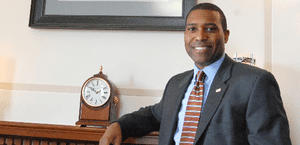 Yesterday, a top lawyer with the Department of Justice appeared in San Francisco to argue against the constitutionality of DOMA.
Yesterday, a top lawyer with the Department of Justice appeared in San Francisco to argue against the constitutionality of DOMA.
He appeared on behalf of Karen Golinski, the federal employee whose routine request to add her wife to her health insurance policy has resulted in a clash between the retained homophobes of the legislative branch and the Obama administration's DOJ, which asserts that DOMA's odious, marriage-defining third section is unconstitutional and shouldn't be enforced. From the Metro Weekly:
Pitting the House Republican leadership-controlled Bipartisan Legal Advisory Group (BLAG) against Golinski and the Obama administration, [yesteday's] hearing presented the question to U.S. District Court Judge Jeffrey S. White whether Golinski's challenge should be dismissed and, if not, whether she should be granted a decision in her favor without a trial.
Assistant Attorney General Tony West, the head of the civil division of DOJ, appeared in court to argue DOJ's position. Lambda Legal's Tara Borelli and Morrison & Foerster's Rita Lin represented Golinski. For BLAG, former George W. Bush administration Solicitor General Paul Clement did not attend the hearing but rather sent Bancroft PLLC's Conor Dugan, another lawyer who had served in the George W. Bush administration DOJ, to handle the arguments.
Speaking to Metro Weekly after the hearing, Borelli said, "Judge White thanked the DOJ for having sent the head of the civil division" to argue the case himself, adding that it made "a statement of the significance that DOJ and the administration place on this question."
During the hearing, Judge White seemed "skeptical" of BLAG's arguments, Metro Weekly reports:
In White's questions, he not only appeared skeptical of BLAG's arguments but also appeared at least curious about BLAG's view of its constitutional basis to be there at all. In one question, he asked, "What is the statutory authority for and evidence of compliance with the role that the Bipartisan Legal Advisory Group has assumed in this matter? Is this group actually bipartisan? Does BLAG have the support – and funding for the increasing cost of defending DOMA – from a majority of Congress or just from the House of Representatives?"
White went on to cite an earlier Supreme Court case about congressional representation in the courts, INS v. Chadha, in which he wrote that the court held that "Congress is the proper party to defend the validity of a statute when an agency of government charged with enforcing the statute agrees that the statute is unconstitutional."
The Golinski case represents the first time BLAG's lawyers have argued for the constitutionality of DOMA in the open air of a courtroom, with all the scrutiny that implies.



